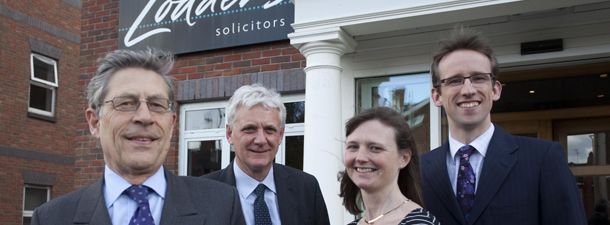Landowners set to be hit by the proposed new HS2 high speed rail line could find themselves further disadvantaged if they continue to fight the project, an expert has warned.
Alastair Frew, a partner with Stratford-upon-Avon law firm Lodders Solicitors, said that in view of the Government go-ahead it was best to cooperate.
But he urged them to go into the exercise with their eyes open in partnership with their legal team.
His comments followed a presentation at which leading barrister Barry Denyer-Green, who is also a top author on compulsory purchase and compensation matters,
addressed guests at a meeting arranged by Lodders Solicitors’ HS2 Advisory Group and held at the firm’s Arden Street offices.
Landowners were advised it was best to allow rail company HS2 Ltd onto their land to conduct geological and environmental surveys – the point the scheme has reached.
“So far the route has essentially been plotted by satellite – now we are into the nitty-gritty,” said Mr Frew.
Cooperating meant landowners were likely to achieve the “best technical solution” to issues on the ground affecting their holding – for example, access, land drainage and environmental protection.
Mr Frew went on: “This fact-finding has to be done eventually. Each landowner knows their specific issues – the railway engineers won’t. So putting this forward at the outset will likely produce the best outcome. They need to make sure they are looked after.
“So my advice would be – cooperate, but with your eyes open and taking advice from your lawyers. At this stage it does not commit you to anything. When the scheme is eventually finalised, landowners will have the opportunity to raise issues of detail by way of a Petition to Parliament, but this is very costly. It is better to try to sort these technical points out now.”
The meeting heard there was considerable uncertainty over various Government assurances such as exceptional hardship payments. “It seems to be getting harder and harder to win one.”
And, with everyone in limbo until the Bill was published, due this autumn, there were also question marks over levels of ‘enhanced compensation’.
Mr Frew said: “The Government has stated that there will be a streamlined compulsory purchase scheme and enhanced compensation, but there is as yet no detail on either.
“We are dubious. We suspect it could end up more or less the standard offer – we wait to see if there are any significant changes but remain cautious.”
Mr Denyer-Green appears regularly in the Lands Tribunal, and has appeared in the Court of Appeal, the House of Lords and the Privy Council on cases concerning compensation issues. He was chairman of the Compulsory Purchase Association in 2008-2009.
He stated: “This was an opportunity for us to find out people’s views concerning HS2 and address concerns about the compulsory purchase procedure. These challenges can be stressful and I hope I helped address some of those fears, offering explanation and guidance.”
David Lodder, senior partner and head of the agriculture department, said: “At Lodders, we understand how the countryside works. As well as our long-standing relationships throughout the agricultural community, we have always had a deep appreciation of the issues faced by farmers and landowners.
“HS2 is a major concern and looks likely to be so for a long time to come. We are seeking to help and advise. Our experience in these matters goes back to the construction of the M40, M42 and A46 when we acted on a significant number of compensation cases.
“HS2 is a development which is bound to be hugely disruptive for many people. There is a lot of worry out there.”



















